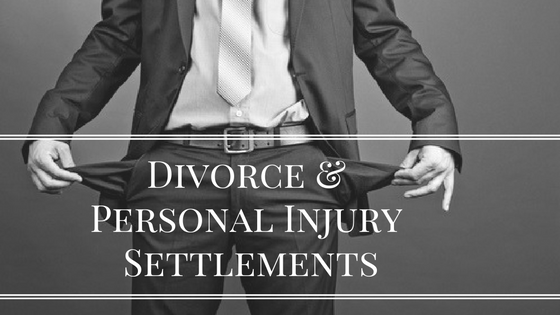Many experienced divorce lawyers have handled cases in which one spouse was in the past awarded a settlement in a personal injury lawsuit and now the other spouse is alleging that they are entitled to one half of that settlement on the grounds that the settlement is “community property.” We will take a look at how personal injury lawsuit awards are handled during divorce proceedings.

How marital property is divided in divorce cases
Divorce cases in which a spouse has been previously awarded a settlement in a personal injury lawsuit are not common but they are certainly not rare either.
Depending on where the divorce action is filed, marital assets can be divided on a community property basis (a “50 – 50 split”) or as an “equitable distribution” of community assets, even though one spouse may consider the “equitable distribution” to be anything but “equitable”.
Texas is a community property state
In Texas, all property acquired during a marriage is presumed to be community property.
In many cases a divorce attorney from the personal injury law firm that originally handled the injured spouse’s lawsuit will also represent the spouse during the divorce proceedings. This will assure that the divorce lawyer will have access to all the information used in the resolution of the injured spouse’s original case, including what factors were used to arrive at the dollar value of the settlement.
The Texas Family Code does allow certain exceptions to the community property rule in specific situations, such as:
- Property acquired by either spouse before the marriage
- An inheritance received by only one spouse
- Gifts presented to, and received by, only one spouse
- Settlements received for a personal injury claim except for the portion of the settlement pertaining to lost wages or other such income.
The Texas Court of Appeals has ruled that it is the responsibility of the spouse claiming one of the exceptions to community property listed above to present “clear and convincing evidence” to support his or her claim for exemption.
In past cases where there has been an issue related to the award received in a personal injury lawsuit, the courts have held that in some instances certain portions of the award are seperate property and are thus exempt from distribution as community property:
- Mental anguish suffered by the injured spouse
- Physical pain and suffering
- Physical disfigurement
- Loss of the spouse’s companionship
These same rulings have also established that other parts of an award are generally community property:
- Lost earnings during the marriage
- Medical expenses that were incurred during the marriage
- Disability insurance and workers’ compensation benefits to the extent that they replaced lost earnings
- Annuity payments that will be made as a part of a settlement
The Texas Family Code, as well as appellate courts rulings, also provide that lump sum settlements will be considered community property unless the injured spouse can prove that a certain part or proportion of that lump sum was made to pay for a condition specifically exempted by law. These rulings have additionally held that, in cases where both spouses were injured and a lump sum payment was made to settle both cases, each spouse must prove that they can “carve out” specific portions of the payment as meeting the seperate property exemption.
In practicality, it is very difficult (but not impossible) to convince a court that such seperate property exemptions are valid claims. This also holds in the case of punitive damages that were awarded as a part of the original personal injury lawsuit, which are held to be community property regardless of which spouse was injured.
Personal injury lawsuits that were filed while married but will not be settled until after a divorce:
An interesting situation arises when a spouse was injured while married, a personal injury lawsuit was filed while married, but the lawsuit will not be settled until after the divorce is finalized. In such cases the injured spouse’s divorce lawyer could have the settlement terms worded in such a way as to have most of the settlement awarded for conditions that would qualify as separate property (e.g. physical and psychological pain) rather than community property.
Summing Up
Since proving such exceptions will usually require a separate accounting review of the assets in question and an equally complex series of legal motions to be presented to the court, it is strongly recommended that residents of the Fort Worth area retain the services of a Fort Worth personal injury lawyer to confirm that the current and future values of the settlement are taken into consideration. As the Law Firm of David S. Kohm & Associates represents residents in all areas of the DFW Metroplex, those who have received a personal injury settlement in the past and are now considering divorce should call or contact us today to ensure that their proposed portion of their settlement is fairly valued.










